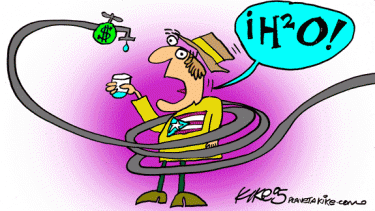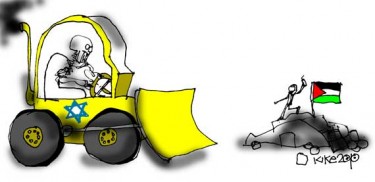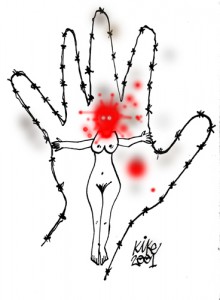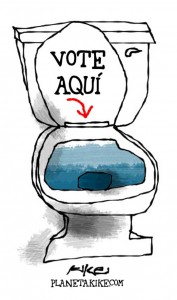Enrique “Kike” Estrada is a cartoonist of an endangered species in Puerto Rico. He is the kind of cartoonist who makes observations and humorous commentaries, caustic at times, about events and news in Puerto Rico. His work has been exhibited in Greece, Argentina, Serbia, Germany, the United States, and Puerto Rico. He has published at least two books of cartoons, but the best space to appreciate his work is through his web page www.planetakike.com [es].
He received me very warmly to talk about his caricatures and the Internet at his home, where he also has a graphic design studio and his own garden, from which he obtains the best possible quality of produce for his kitchen.
Kike started talking a little about how he chooses the themes that he develops for his drawings:

Kike Estrada
Kike Estrada (KE): Antes yo dibujaba todos los días reaccionando a las cosas que pasaban en Puerto Rico. […] Pues, ya yo no dibujo ese tipo de cosa. Hay un momento en donde pensé que en lugar de estar haciéndolo bien lo estaba haciendo mal porque era parte del ruido en vez de parte de las soluciones. Y entonces eso como que me alejó un poco del trabajo. Cuando lo he retomado ahora, pues, dibujo más de cosas que son muy pertinentes en Puerto Rico, pero trato de que sean pertinentes para no puertorriqueños; o sea, tratando de trabajar los asuntos en vez de las situaciones. […] Yo sé que habría una demanda por dibujar de lo específico del día, pero hay tanto ruido con respecto a esas cosas, que añadir ruido no es saludable.
But Kike didn't always draw cartoons. His creative capacity was mostly occupied with graphic design, and for a time he didn't work on caricatures at all:
KE: ¿Tú sabes cuándo yo volví a dibujar caricaturas? Yo volví a dibujar caricaturas el día que le metieron los dos aviones a las Torres Gemelas. […] Yo puse el televisor. Cuando vi que un segundo avión le estaba dando a una torre, yo dije, “Se jodió el mundo. El mundo cambió hoy”. Y eso me causó una ansiedad tan cabrona, mano, que me puse a dibujar. […] Me volví loco dibujando. Y de ahí no he vuelto a parar.
For a cartoonist with his sense of humor, ironical and satirical, and his ability to broach and highlight the absurd side of the issues that affect Puerto Ricans, the Internet happens to be the perfect place to exhibit his work. In this space, as the sole editor, he found freedom to express his point of view, which otherwise would be almost impossible to express:
KE: Como yo soy diseñador gráfico, hubo un momento en donde empezamos a aprender Internet porque el mundo había cambiado, y los clientes que antes yo tenía que hacían anuncios de prensa o cosas, pues todos ahora querían tener presencia en el Internet. Así que nosotros fuimos aprendiendo de eso. Y yo dije, “Bueno, pues yo voy a hacer una página de mi trabajo”. Y ha sido bien chévere porque no es censurable. O sea, yo hago lo que yo quiero hacer ahí, y digo lo que yo quiero decir ahí.
However, Kike doesn't see himself as someone who has mastered the art of drawing cartoons. According to him, his contribution lies not so much in the quality of his drawings, but in the message he tries to send:
KE: Yo soy miembro de la Asociación de Caricaturistas [de Puerto Rico]. Ahí hay unos chamacos jóvenes que son unos virtuosos, mano […] En el caso mío, yo no soy un virtuoso. Yo soy en todo caso un dibujante como sui generis. Yo no dibujo bien. Yo dibujo mal. Lo que pasa es que ya desarrollé una forma de dibujar mal que me gusta cómo se ve.
On the cartoonists trade in journalism and how it has gradually disappeared in many newspapers in Puerto Rico, he thinks:
KE: Yo creo que los periódicos han ido prescindiendo de los servicios de los caricaturistas porque los caricaturistas pueden herirte más que una foto.
Kike sees the Internet as as an important resource for cartoonists. For him, the Internet is among the greatest inventions ever created. He marvels at the possibilities it can offer. Thanks to the Internet, cartoons can survive despite its disappearance from traditional spaces in the newspapers. Furthermore, the Internet eliminates the filter that news goes through before it hits the presses. But the benefits of the Internet are not only for cartoonists:
KE: El Internet ha sido bien bueno porque le ha dado voz al que no tenía voz. ¿Cómo carajo yo hubiera podido dar a conocer mis dibujos si no existiera el Internet? Tendría un paquete de dibujos ahí que nadie hubiera visto porque no había salida; el Internet te da la salida. Y por eso es que hay que enseñarle a todo el mundo el Internet. Hay que enseñarlos a que programen páginas y a que diseñen sus propias cosas y que después digan los disparates que les dé la gana de decir, o que hagan las genialidades que les dé la gana de hacer, pero que la gente tenga la opción de agarrarse del Internet como el medio más accesible que tenemos.
All images have been published with permission.










